Social Cognitive Theory: Exploring Human Nature and Behavior Analysis
VerifiedAdded on 2022/12/27
|7
|1822
|35
Essay
AI Summary
This essay provides an overview of Albert Bandura's Social Cognitive Theory, examining how individual actions, experiences, and environmental factors influence behavior. It delves into the core components of the theory, including self-efficacy, behavioral capability, expectations, self-control, observational learning, and reinforcements. The essay discusses the nature of human nature from the perspective of this theory, exploring personal, environmental, and behavioral factors. It examines how these factors interact to shape an individual's actions and interactions with their surroundings, highlighting the role of imitation, emotional reactions, and individual differences in learning and behavioral change. Furthermore, the essay references the importance of social and environmental influences on an individual's behavior, highlighting how the environment can either encourage or discourage certain actions. The analysis includes discussions on the influence of the environment, social interaction, and past experiences.
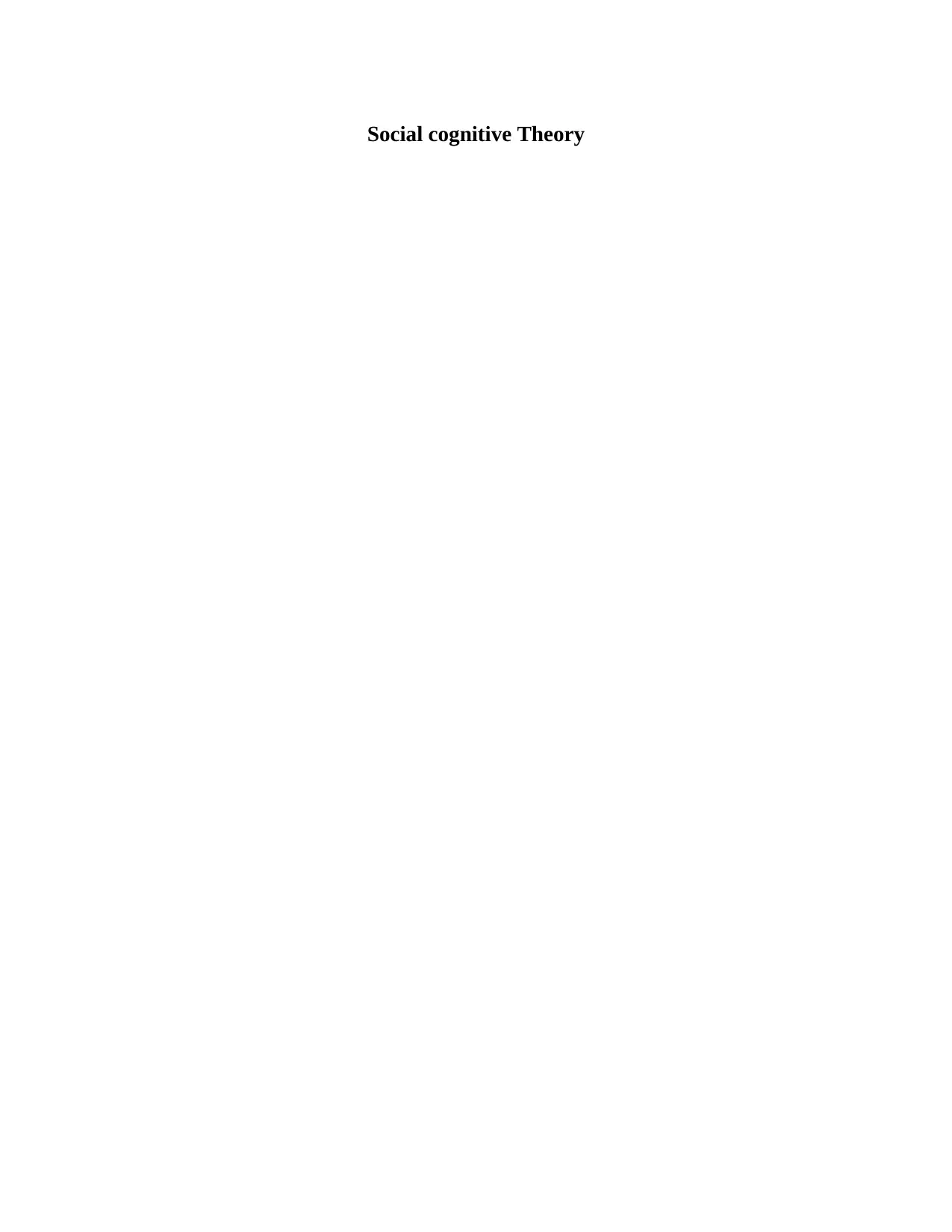
Social cognitive Theory
Paraphrase This Document
Need a fresh take? Get an instant paraphrase of this document with our AI Paraphraser
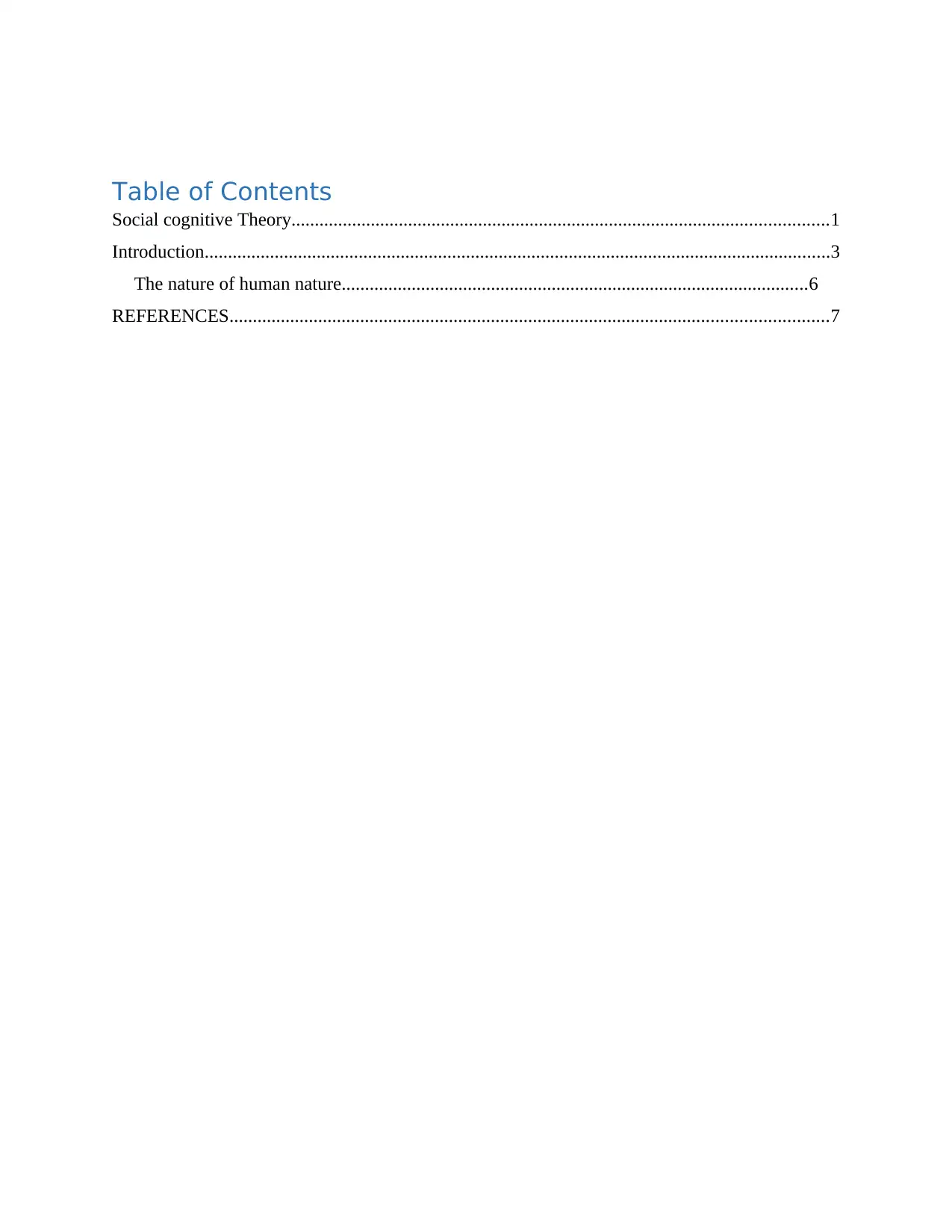
Table of Contents
Social cognitive Theory...................................................................................................................1
Introduction......................................................................................................................................3
The nature of human nature....................................................................................................6
REFERENCES................................................................................................................................7
Social cognitive Theory...................................................................................................................1
Introduction......................................................................................................................................3
The nature of human nature....................................................................................................6
REFERENCES................................................................................................................................7
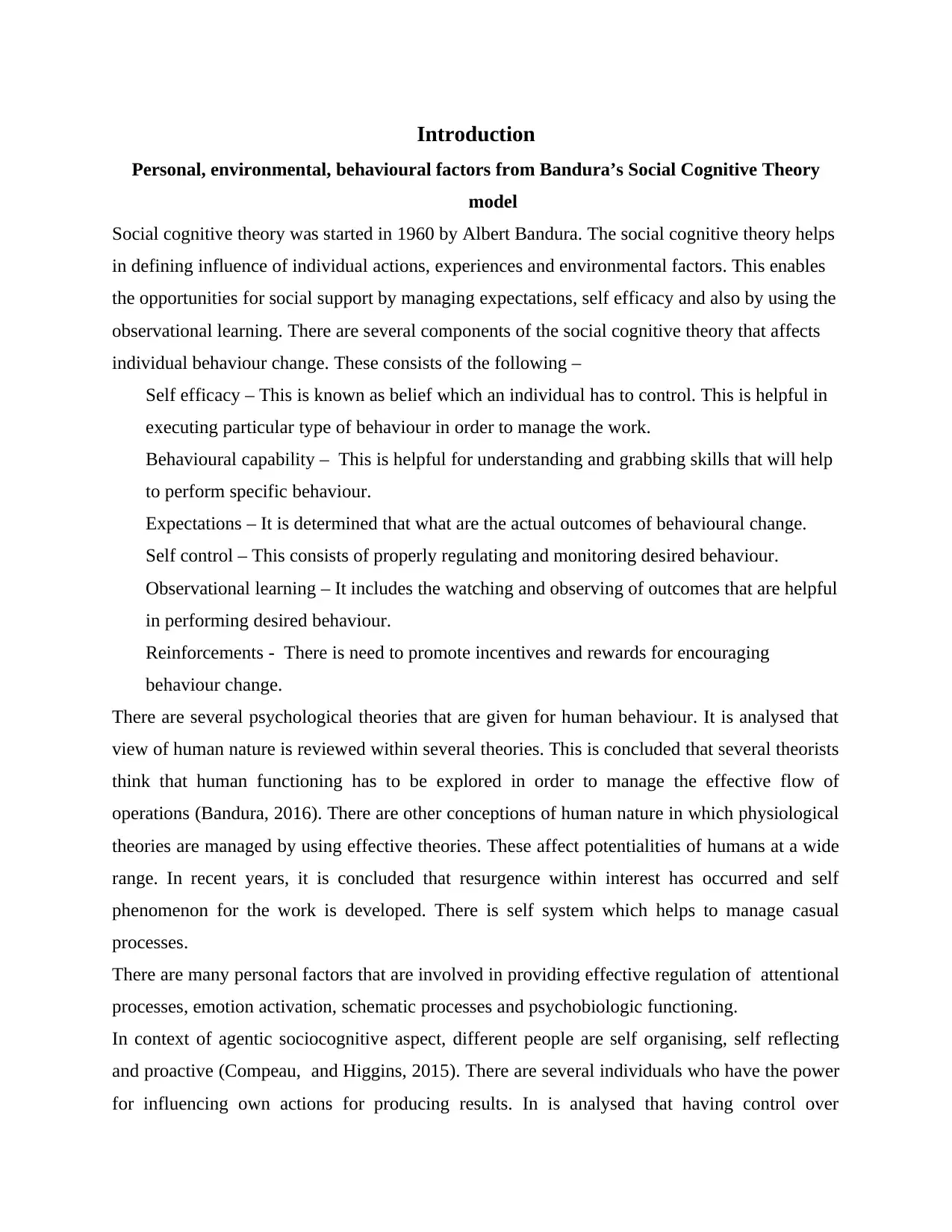
Introduction
Personal, environmental, behavioural factors from Bandura’s Social Cognitive Theory
model
Social cognitive theory was started in 1960 by Albert Bandura. The social cognitive theory helps
in defining influence of individual actions, experiences and environmental factors. This enables
the opportunities for social support by managing expectations, self efficacy and also by using the
observational learning. There are several components of the social cognitive theory that affects
individual behaviour change. These consists of the following –
Self efficacy – This is known as belief which an individual has to control. This is helpful in
executing particular type of behaviour in order to manage the work.
Behavioural capability – This is helpful for understanding and grabbing skills that will help
to perform specific behaviour.
Expectations – It is determined that what are the actual outcomes of behavioural change.
Self control – This consists of properly regulating and monitoring desired behaviour.
Observational learning – It includes the watching and observing of outcomes that are helpful
in performing desired behaviour.
Reinforcements - There is need to promote incentives and rewards for encouraging
behaviour change.
There are several psychological theories that are given for human behaviour. It is analysed that
view of human nature is reviewed within several theories. This is concluded that several theorists
think that human functioning has to be explored in order to manage the effective flow of
operations (Bandura, 2016). There are other conceptions of human nature in which physiological
theories are managed by using effective theories. These affect potentialities of humans at a wide
range. In recent years, it is concluded that resurgence within interest has occurred and self
phenomenon for the work is developed. There is self system which helps to manage casual
processes.
There are many personal factors that are involved in providing effective regulation of attentional
processes, emotion activation, schematic processes and psychobiologic functioning.
In context of agentic sociocognitive aspect, different people are self organising, self reflecting
and proactive (Compeau, and Higgins, 2015). There are several individuals who have the power
for influencing own actions for producing results. In is analysed that having control over
Personal, environmental, behavioural factors from Bandura’s Social Cognitive Theory
model
Social cognitive theory was started in 1960 by Albert Bandura. The social cognitive theory helps
in defining influence of individual actions, experiences and environmental factors. This enables
the opportunities for social support by managing expectations, self efficacy and also by using the
observational learning. There are several components of the social cognitive theory that affects
individual behaviour change. These consists of the following –
Self efficacy – This is known as belief which an individual has to control. This is helpful in
executing particular type of behaviour in order to manage the work.
Behavioural capability – This is helpful for understanding and grabbing skills that will help
to perform specific behaviour.
Expectations – It is determined that what are the actual outcomes of behavioural change.
Self control – This consists of properly regulating and monitoring desired behaviour.
Observational learning – It includes the watching and observing of outcomes that are helpful
in performing desired behaviour.
Reinforcements - There is need to promote incentives and rewards for encouraging
behaviour change.
There are several psychological theories that are given for human behaviour. It is analysed that
view of human nature is reviewed within several theories. This is concluded that several theorists
think that human functioning has to be explored in order to manage the effective flow of
operations (Bandura, 2016). There are other conceptions of human nature in which physiological
theories are managed by using effective theories. These affect potentialities of humans at a wide
range. In recent years, it is concluded that resurgence within interest has occurred and self
phenomenon for the work is developed. There is self system which helps to manage casual
processes.
There are many personal factors that are involved in providing effective regulation of attentional
processes, emotion activation, schematic processes and psychobiologic functioning.
In context of agentic sociocognitive aspect, different people are self organising, self reflecting
and proactive (Compeau, and Higgins, 2015). There are several individuals who have the power
for influencing own actions for producing results. In is analysed that having control over
⊘ This is a preview!⊘
Do you want full access?
Subscribe today to unlock all pages.

Trusted by 1+ million students worldwide
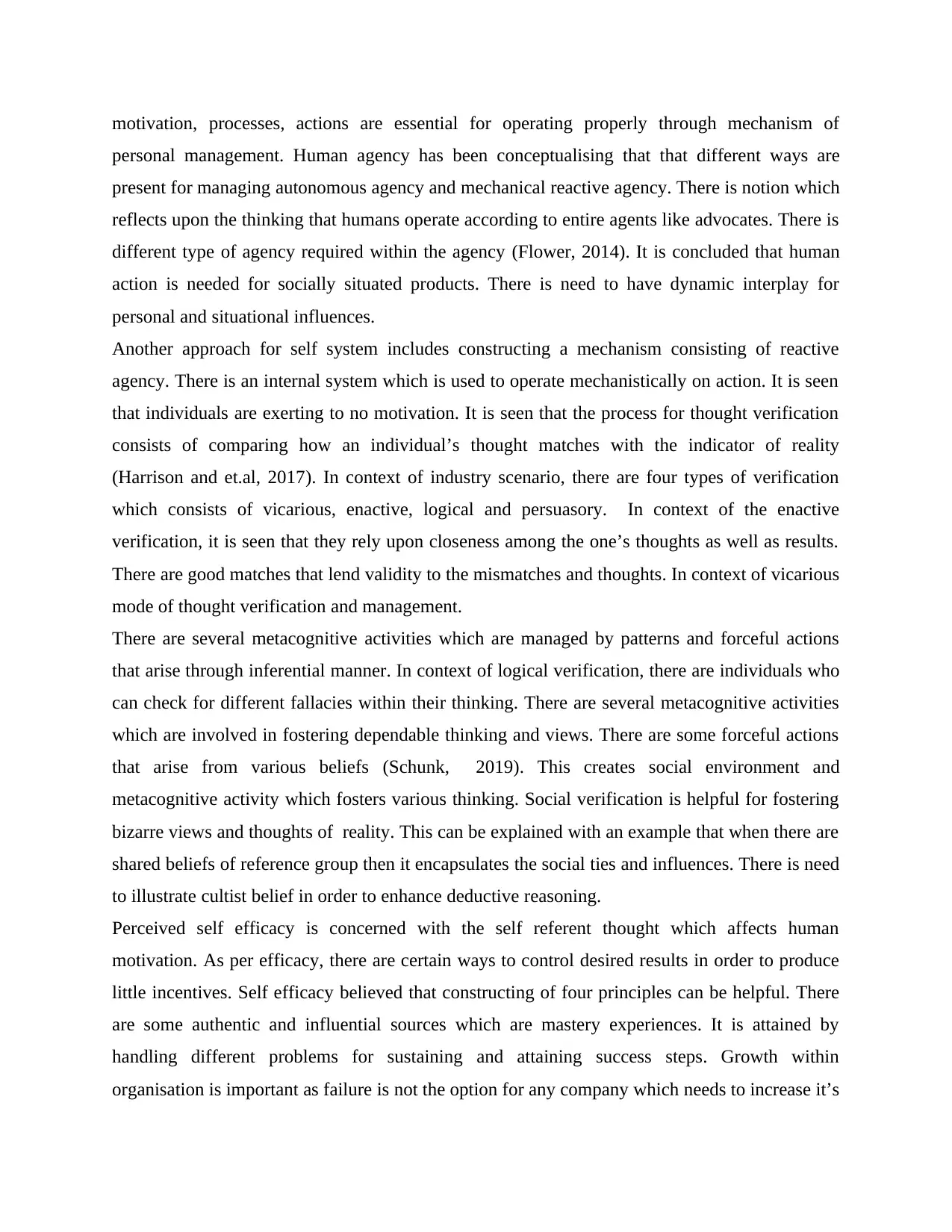
motivation, processes, actions are essential for operating properly through mechanism of
personal management. Human agency has been conceptualising that that different ways are
present for managing autonomous agency and mechanical reactive agency. There is notion which
reflects upon the thinking that humans operate according to entire agents like advocates. There is
different type of agency required within the agency (Flower, 2014). It is concluded that human
action is needed for socially situated products. There is need to have dynamic interplay for
personal and situational influences.
Another approach for self system includes constructing a mechanism consisting of reactive
agency. There is an internal system which is used to operate mechanistically on action. It is seen
that individuals are exerting to no motivation. It is seen that the process for thought verification
consists of comparing how an individual’s thought matches with the indicator of reality
(Harrison and et.al, 2017). In context of industry scenario, there are four types of verification
which consists of vicarious, enactive, logical and persuasory. In context of the enactive
verification, it is seen that they rely upon closeness among the one’s thoughts as well as results.
There are good matches that lend validity to the mismatches and thoughts. In context of vicarious
mode of thought verification and management.
There are several metacognitive activities which are managed by patterns and forceful actions
that arise through inferential manner. In context of logical verification, there are individuals who
can check for different fallacies within their thinking. There are several metacognitive activities
which are involved in fostering dependable thinking and views. There are some forceful actions
that arise from various beliefs (Schunk, 2019). This creates social environment and
metacognitive activity which fosters various thinking. Social verification is helpful for fostering
bizarre views and thoughts of reality. This can be explained with an example that when there are
shared beliefs of reference group then it encapsulates the social ties and influences. There is need
to illustrate cultist belief in order to enhance deductive reasoning.
Perceived self efficacy is concerned with the self referent thought which affects human
motivation. As per efficacy, there are certain ways to control desired results in order to produce
little incentives. Self efficacy believed that constructing of four principles can be helpful. There
are some authentic and influential sources which are mastery experiences. It is attained by
handling different problems for sustaining and attaining success steps. Growth within
organisation is important as failure is not the option for any company which needs to increase it’s
personal management. Human agency has been conceptualising that that different ways are
present for managing autonomous agency and mechanical reactive agency. There is notion which
reflects upon the thinking that humans operate according to entire agents like advocates. There is
different type of agency required within the agency (Flower, 2014). It is concluded that human
action is needed for socially situated products. There is need to have dynamic interplay for
personal and situational influences.
Another approach for self system includes constructing a mechanism consisting of reactive
agency. There is an internal system which is used to operate mechanistically on action. It is seen
that individuals are exerting to no motivation. It is seen that the process for thought verification
consists of comparing how an individual’s thought matches with the indicator of reality
(Harrison and et.al, 2017). In context of industry scenario, there are four types of verification
which consists of vicarious, enactive, logical and persuasory. In context of the enactive
verification, it is seen that they rely upon closeness among the one’s thoughts as well as results.
There are good matches that lend validity to the mismatches and thoughts. In context of vicarious
mode of thought verification and management.
There are several metacognitive activities which are managed by patterns and forceful actions
that arise through inferential manner. In context of logical verification, there are individuals who
can check for different fallacies within their thinking. There are several metacognitive activities
which are involved in fostering dependable thinking and views. There are some forceful actions
that arise from various beliefs (Schunk, 2019). This creates social environment and
metacognitive activity which fosters various thinking. Social verification is helpful for fostering
bizarre views and thoughts of reality. This can be explained with an example that when there are
shared beliefs of reference group then it encapsulates the social ties and influences. There is need
to illustrate cultist belief in order to enhance deductive reasoning.
Perceived self efficacy is concerned with the self referent thought which affects human
motivation. As per efficacy, there are certain ways to control desired results in order to produce
little incentives. Self efficacy believed that constructing of four principles can be helpful. There
are some authentic and influential sources which are mastery experiences. It is attained by
handling different problems for sustaining and attaining success steps. Growth within
organisation is important as failure is not the option for any company which needs to increase it’s
Paraphrase This Document
Need a fresh take? Get an instant paraphrase of this document with our AI Paraphraser
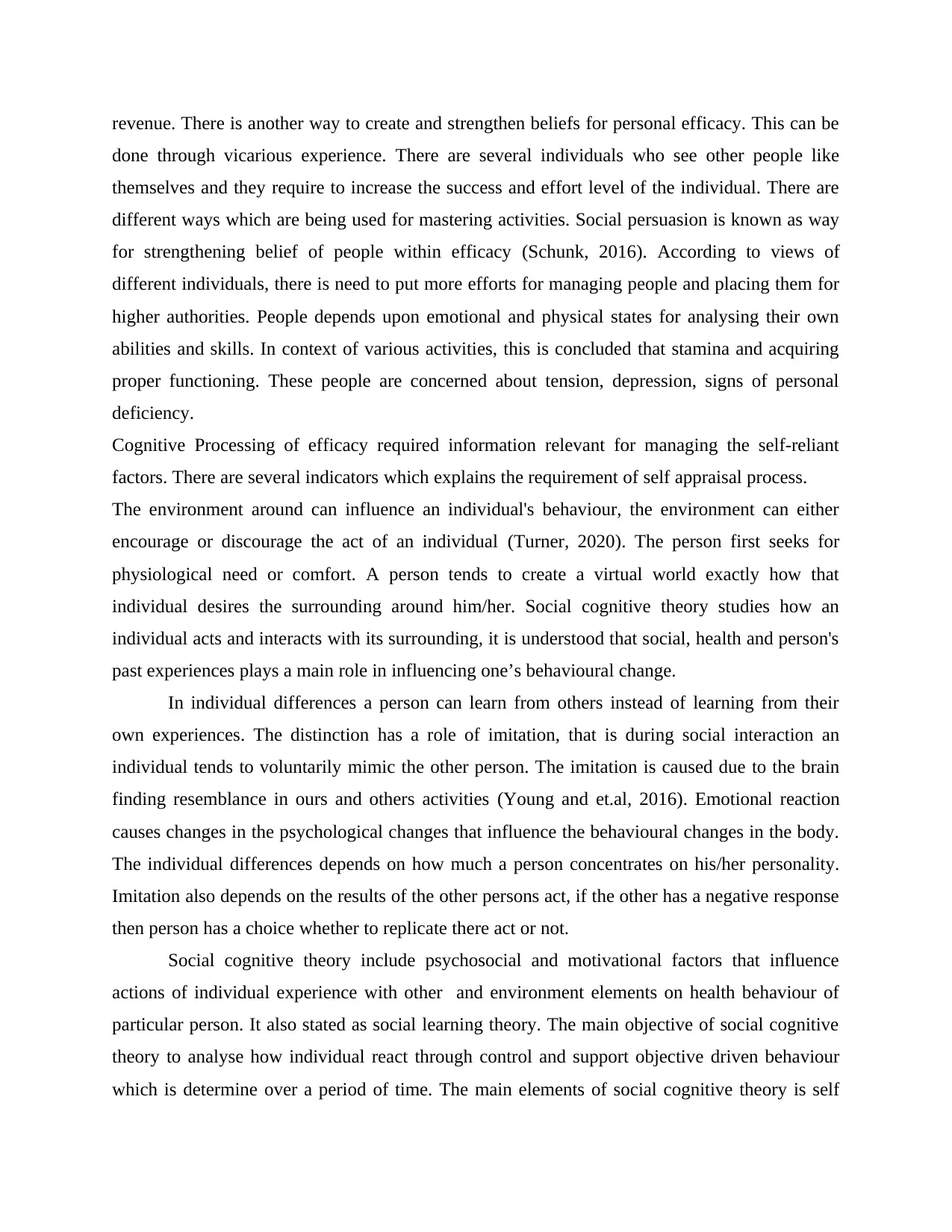
revenue. There is another way to create and strengthen beliefs for personal efficacy. This can be
done through vicarious experience. There are several individuals who see other people like
themselves and they require to increase the success and effort level of the individual. There are
different ways which are being used for mastering activities. Social persuasion is known as way
for strengthening belief of people within efficacy (Schunk, 2016). According to views of
different individuals, there is need to put more efforts for managing people and placing them for
higher authorities. People depends upon emotional and physical states for analysing their own
abilities and skills. In context of various activities, this is concluded that stamina and acquiring
proper functioning. These people are concerned about tension, depression, signs of personal
deficiency.
Cognitive Processing of efficacy required information relevant for managing the self-reliant
factors. There are several indicators which explains the requirement of self appraisal process.
The environment around can influence an individual's behaviour, the environment can either
encourage or discourage the act of an individual (Turner, 2020). The person first seeks for
physiological need or comfort. A person tends to create a virtual world exactly how that
individual desires the surrounding around him/her. Social cognitive theory studies how an
individual acts and interacts with its surrounding, it is understood that social, health and person's
past experiences plays a main role in influencing one’s behavioural change.
In individual differences a person can learn from others instead of learning from their
own experiences. The distinction has a role of imitation, that is during social interaction an
individual tends to voluntarily mimic the other person. The imitation is caused due to the brain
finding resemblance in ours and others activities (Young and et.al, 2016). Emotional reaction
causes changes in the psychological changes that influence the behavioural changes in the body.
The individual differences depends on how much a person concentrates on his/her personality.
Imitation also depends on the results of the other persons act, if the other has a negative response
then person has a choice whether to replicate there act or not.
Social cognitive theory include psychosocial and motivational factors that influence
actions of individual experience with other and environment elements on health behaviour of
particular person. It also stated as social learning theory. The main objective of social cognitive
theory to analyse how individual react through control and support objective driven behaviour
which is determine over a period of time. The main elements of social cognitive theory is self
done through vicarious experience. There are several individuals who see other people like
themselves and they require to increase the success and effort level of the individual. There are
different ways which are being used for mastering activities. Social persuasion is known as way
for strengthening belief of people within efficacy (Schunk, 2016). According to views of
different individuals, there is need to put more efforts for managing people and placing them for
higher authorities. People depends upon emotional and physical states for analysing their own
abilities and skills. In context of various activities, this is concluded that stamina and acquiring
proper functioning. These people are concerned about tension, depression, signs of personal
deficiency.
Cognitive Processing of efficacy required information relevant for managing the self-reliant
factors. There are several indicators which explains the requirement of self appraisal process.
The environment around can influence an individual's behaviour, the environment can either
encourage or discourage the act of an individual (Turner, 2020). The person first seeks for
physiological need or comfort. A person tends to create a virtual world exactly how that
individual desires the surrounding around him/her. Social cognitive theory studies how an
individual acts and interacts with its surrounding, it is understood that social, health and person's
past experiences plays a main role in influencing one’s behavioural change.
In individual differences a person can learn from others instead of learning from their
own experiences. The distinction has a role of imitation, that is during social interaction an
individual tends to voluntarily mimic the other person. The imitation is caused due to the brain
finding resemblance in ours and others activities (Young and et.al, 2016). Emotional reaction
causes changes in the psychological changes that influence the behavioural changes in the body.
The individual differences depends on how much a person concentrates on his/her personality.
Imitation also depends on the results of the other persons act, if the other has a negative response
then person has a choice whether to replicate there act or not.
Social cognitive theory include psychosocial and motivational factors that influence
actions of individual experience with other and environment elements on health behaviour of
particular person. It also stated as social learning theory. The main objective of social cognitive
theory to analyse how individual react through control and support objective driven behaviour
which is determine over a period of time. The main elements of social cognitive theory is self
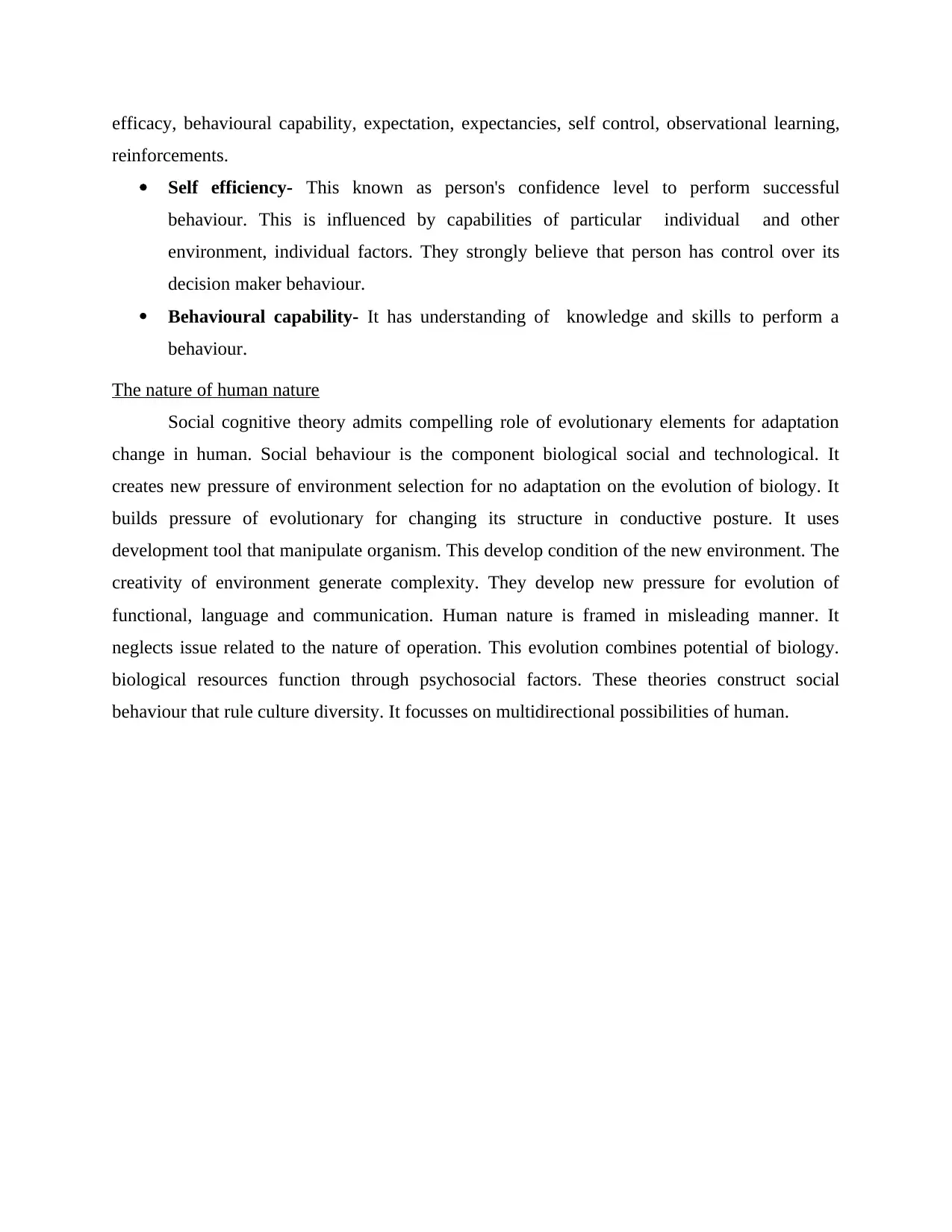
efficacy, behavioural capability, expectation, expectancies, self control, observational learning,
reinforcements.
Self efficiency- This known as person's confidence level to perform successful
behaviour. This is influenced by capabilities of particular individual and other
environment, individual factors. They strongly believe that person has control over its
decision maker behaviour.
Behavioural capability- It has understanding of knowledge and skills to perform a
behaviour.
The nature of human nature
Social cognitive theory admits compelling role of evolutionary elements for adaptation
change in human. Social behaviour is the component biological social and technological. It
creates new pressure of environment selection for no adaptation on the evolution of biology. It
builds pressure of evolutionary for changing its structure in conductive posture. It uses
development tool that manipulate organism. This develop condition of the new environment. The
creativity of environment generate complexity. They develop new pressure for evolution of
functional, language and communication. Human nature is framed in misleading manner. It
neglects issue related to the nature of operation. This evolution combines potential of biology.
biological resources function through psychosocial factors. These theories construct social
behaviour that rule culture diversity. It focusses on multidirectional possibilities of human.
reinforcements.
Self efficiency- This known as person's confidence level to perform successful
behaviour. This is influenced by capabilities of particular individual and other
environment, individual factors. They strongly believe that person has control over its
decision maker behaviour.
Behavioural capability- It has understanding of knowledge and skills to perform a
behaviour.
The nature of human nature
Social cognitive theory admits compelling role of evolutionary elements for adaptation
change in human. Social behaviour is the component biological social and technological. It
creates new pressure of environment selection for no adaptation on the evolution of biology. It
builds pressure of evolutionary for changing its structure in conductive posture. It uses
development tool that manipulate organism. This develop condition of the new environment. The
creativity of environment generate complexity. They develop new pressure for evolution of
functional, language and communication. Human nature is framed in misleading manner. It
neglects issue related to the nature of operation. This evolution combines potential of biology.
biological resources function through psychosocial factors. These theories construct social
behaviour that rule culture diversity. It focusses on multidirectional possibilities of human.
⊘ This is a preview!⊘
Do you want full access?
Subscribe today to unlock all pages.

Trusted by 1+ million students worldwide
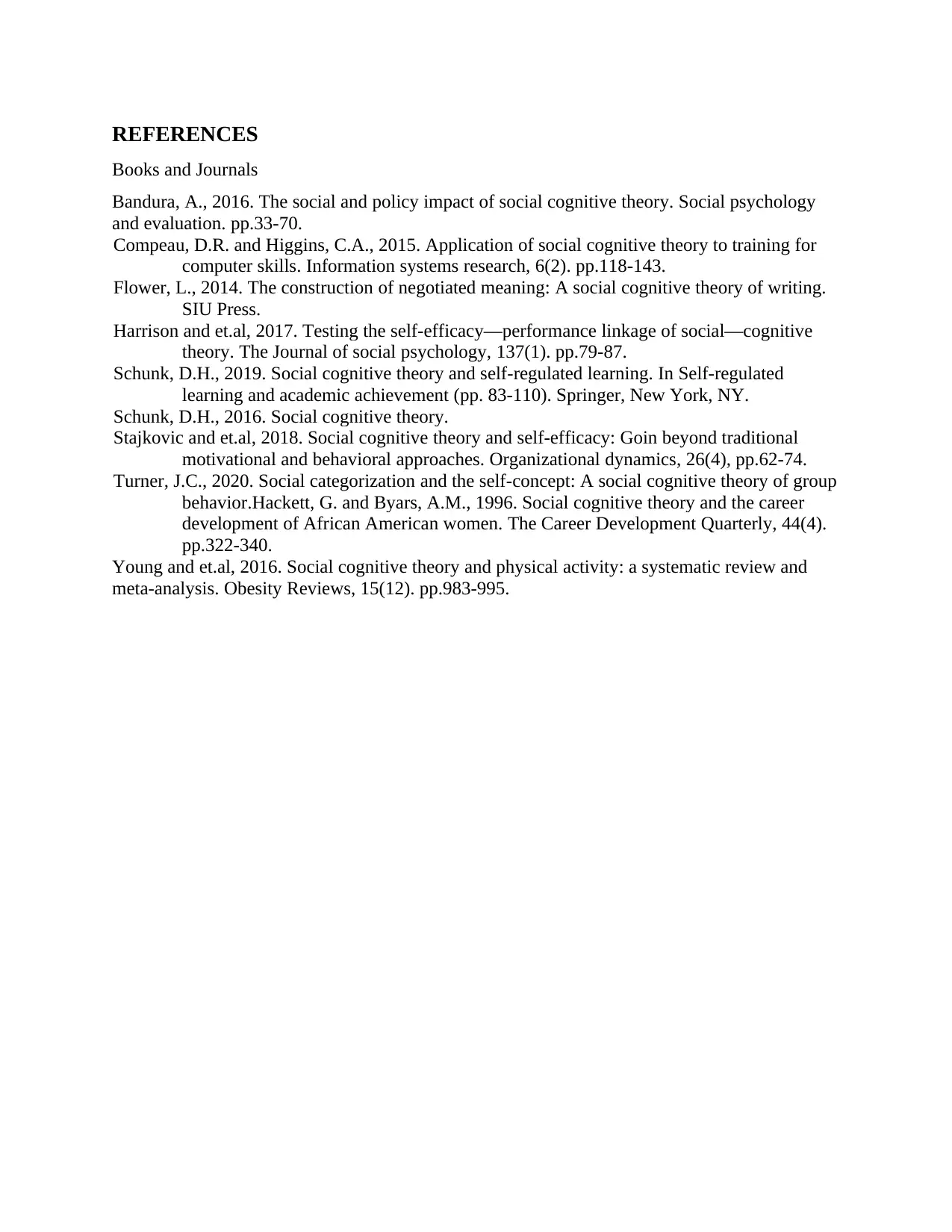
REFERENCES
Books and Journals
Bandura, A., 2016. The social and policy impact of social cognitive theory. Social psychology
and evaluation. pp.33-70.
Compeau, D.R. and Higgins, C.A., 2015. Application of social cognitive theory to training for
computer skills. Information systems research, 6(2). pp.118-143.
Flower, L., 2014. The construction of negotiated meaning: A social cognitive theory of writing.
SIU Press.
Harrison and et.al, 2017. Testing the self-efficacy—performance linkage of social—cognitive
theory. The Journal of social psychology, 137(1). pp.79-87.
Schunk, D.H., 2019. Social cognitive theory and self-regulated learning. In Self-regulated
learning and academic achievement (pp. 83-110). Springer, New York, NY.
Schunk, D.H., 2016. Social cognitive theory.
Stajkovic and et.al, 2018. Social cognitive theory and self-efficacy: Goin beyond traditional
motivational and behavioral approaches. Organizational dynamics, 26(4), pp.62-74.
Turner, J.C., 2020. Social categorization and the self-concept: A social cognitive theory of group
behavior.Hackett, G. and Byars, A.M., 1996. Social cognitive theory and the career
development of African American women. The Career Development Quarterly, 44(4).
pp.322-340.
Young and et.al, 2016. Social cognitive theory and physical activity: a systematic review and
meta‐analysis. Obesity Reviews, 15(12). pp.983-995.
Books and Journals
Bandura, A., 2016. The social and policy impact of social cognitive theory. Social psychology
and evaluation. pp.33-70.
Compeau, D.R. and Higgins, C.A., 2015. Application of social cognitive theory to training for
computer skills. Information systems research, 6(2). pp.118-143.
Flower, L., 2014. The construction of negotiated meaning: A social cognitive theory of writing.
SIU Press.
Harrison and et.al, 2017. Testing the self-efficacy—performance linkage of social—cognitive
theory. The Journal of social psychology, 137(1). pp.79-87.
Schunk, D.H., 2019. Social cognitive theory and self-regulated learning. In Self-regulated
learning and academic achievement (pp. 83-110). Springer, New York, NY.
Schunk, D.H., 2016. Social cognitive theory.
Stajkovic and et.al, 2018. Social cognitive theory and self-efficacy: Goin beyond traditional
motivational and behavioral approaches. Organizational dynamics, 26(4), pp.62-74.
Turner, J.C., 2020. Social categorization and the self-concept: A social cognitive theory of group
behavior.Hackett, G. and Byars, A.M., 1996. Social cognitive theory and the career
development of African American women. The Career Development Quarterly, 44(4).
pp.322-340.
Young and et.al, 2016. Social cognitive theory and physical activity: a systematic review and
meta‐analysis. Obesity Reviews, 15(12). pp.983-995.
1 out of 7
Related Documents
Your All-in-One AI-Powered Toolkit for Academic Success.
+13062052269
info@desklib.com
Available 24*7 on WhatsApp / Email
![[object Object]](/_next/static/media/star-bottom.7253800d.svg)
Unlock your academic potential
Copyright © 2020–2026 A2Z Services. All Rights Reserved. Developed and managed by ZUCOL.





